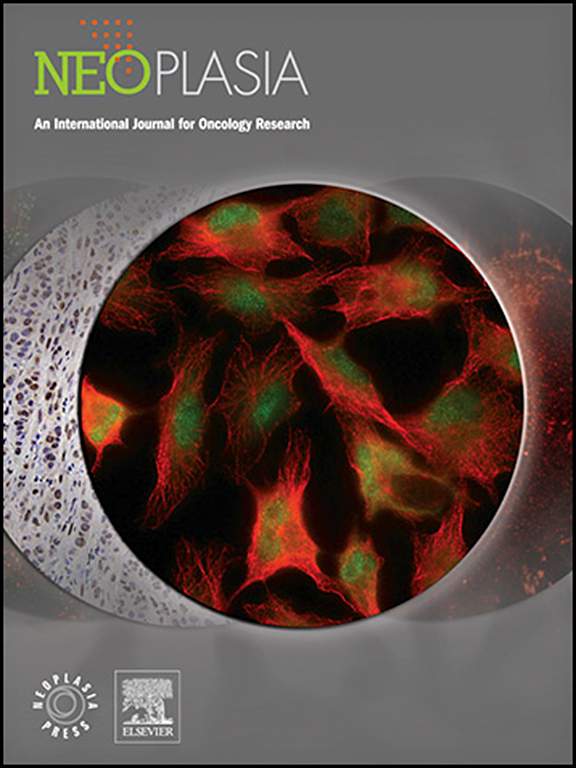Non-redundant roles of the CCR1 and CCR2 chemokine axes in monocyte recruitment during lung metastasis
IF 4.8
2区 医学
Q1 Biochemistry, Genetics and Molecular Biology
引用次数: 0
Abstract
Monocytes and monocyte-derived macrophages facilitate cancer progression and metastasis. Inflammatory monocytes expressing CCR2 are actively recruited to metastatic lungs, where they promote tumor cell extravasation, metastatic outgrowth, and an immunosuppressive environment. The role of CCR1 in this process has remained unclear. We used Ccr1- and Ccr2-deficient mice and two different tumor cells lines, MC38 and LLC1 with and without Ccl2-deficiency in vitro and in vivo. The recruitment of both Ccr1- and Ccr2-deficient monocytes towards the Ccl2 chemokine was significantly impaired, while no substantial recruitment was observed towards Ccl5 in vitro. MC38 and LLC1 Ccl2-deficient tumor cells showed reduced lung metastasis in both Ccr1- and Ccr2-deficient mice when compared to wild-type mice. We detected reduced numbers of macrophages and myeloid cells in both chemokine receptor-deficient mice. Lung metastasis in both Ccr1- and Ccr2-deficient mice could be rescued to the same levels as in wild-type mice by an adoptive transfer of Ccr2-deficient but not Ccr1-deficient monocytic cells. Accumulation of Ccr1-deficient monocytes in the lungs was severely impaired upon intravenous monocyte injection, indicating the importance of this axis in cell recruitment. Moreover, the efficient recruitment of adoptive transferred Ccr2-deficient monocytes to the lungs and the restoration of lung metastasis suggests an involvement of an additional, Ccr2-independent chemokine pathway. This data defines the non-redundant functions of the Ccr1- and Ccr2-chemokine axes in monocyte recruitment and macrophage presence during lung metastasis. While Ccr2 is essential for the release of monocytes from the bone marrow, Ccr1 is primarily responsible for monocyte presence at metastatic sites.
CCR1和CCR2趋化因子轴在肺转移过程中单核细胞招募中的非冗余作用
单核细胞和单核细胞衍生的巨噬细胞有助于癌症的发展和转移。表达 CCR2 的炎性单核细胞被积极招募到转移性肺部,在那里它们促进肿瘤细胞外渗、转移生长和免疫抑制环境。CCR1 在这一过程中的作用仍不清楚。我们利用 Ccr1 和 Ccr2 缺失的小鼠以及两种不同的肿瘤细胞系 MC38 和 LLC1(有无 Ccl2 缺失)在体外和体内进行了研究。Ccr1和Ccr2缺失的单核细胞对Ccl2趋化因子的募集都明显受损,而在体外没有观察到对Ccl5的大量募集。与野生型小鼠相比,MC38和LLC1 Ccl2缺陷型肿瘤细胞在Ccr1和Ccr2缺陷型小鼠体内的肺转移均有所减少。我们在两种趋化因子受体缺陷小鼠体内都检测到了巨噬细胞和髓细胞数量的减少。Ccr1和Ccr2缺陷型小鼠的肺转移可通过收养性转移Ccr2缺陷型而非Ccr1缺陷型单核细胞而被挽救至与野生型小鼠相同的水平。静脉注射单核细胞后,Ccr1缺陷单核细胞在肺部的聚集受到严重影响,这表明该轴在细胞招募中的重要性。此外,Ccr2缺陷型单核细胞在肺部的有效招募以及肺转移的恢复表明,还有一种独立于Ccr2的趋化因子途径参与其中。这些数据确定了Ccr1-和Ccr2-趋化因子轴在肺转移过程中单核细胞招募和巨噬细胞存在方面的非冗余功能。Ccr2对于单核细胞从骨髓中释放至关重要,而Ccr1则主要负责单核细胞在转移部位的存在。
本文章由计算机程序翻译,如有差异,请以英文原文为准。
求助全文
约1分钟内获得全文
求助全文
来源期刊

Neoplasia
医学-肿瘤学
CiteScore
9.20
自引率
2.10%
发文量
82
审稿时长
26 days
期刊介绍:
Neoplasia publishes the results of novel investigations in all areas of oncology research. The title Neoplasia was chosen to convey the journal’s breadth, which encompasses the traditional disciplines of cancer research as well as emerging fields and interdisciplinary investigations. Neoplasia is interested in studies describing new molecular and genetic findings relating to the neoplastic phenotype and in laboratory and clinical studies demonstrating creative applications of advances in the basic sciences to risk assessment, prognostic indications, detection, diagnosis, and treatment. In addition to regular Research Reports, Neoplasia also publishes Reviews and Meeting Reports. Neoplasia is committed to ensuring a thorough, fair, and rapid review and publication schedule to further its mission of serving both the scientific and clinical communities by disseminating important data and ideas in cancer research.
 求助内容:
求助内容: 应助结果提醒方式:
应助结果提醒方式:


